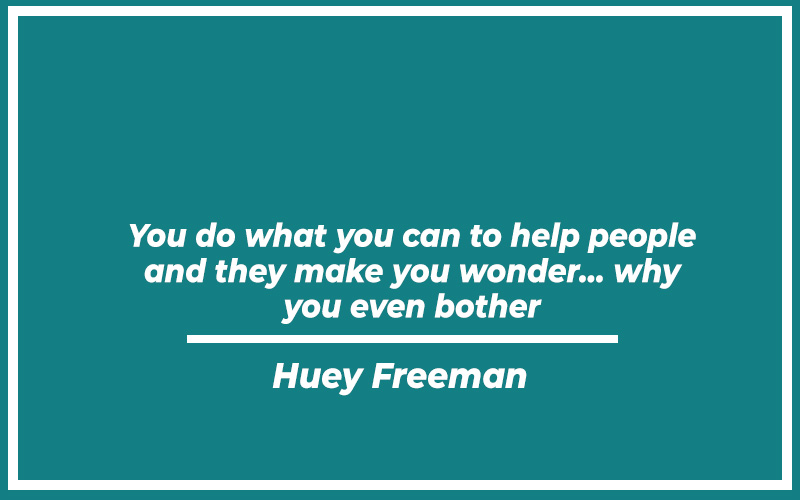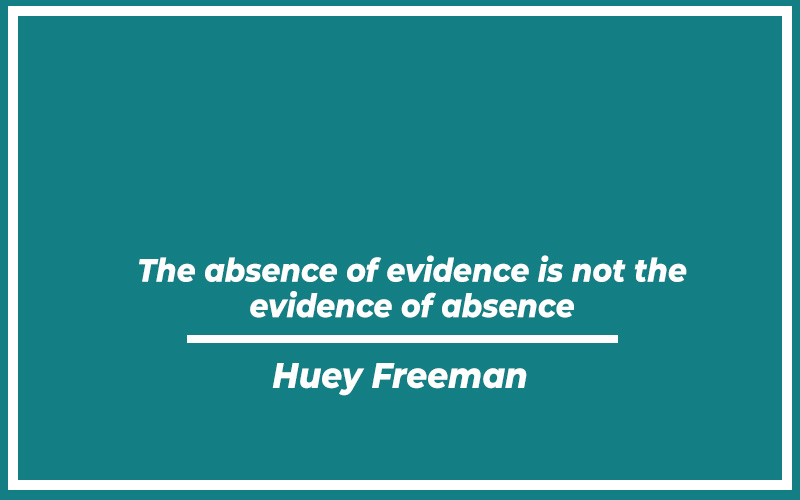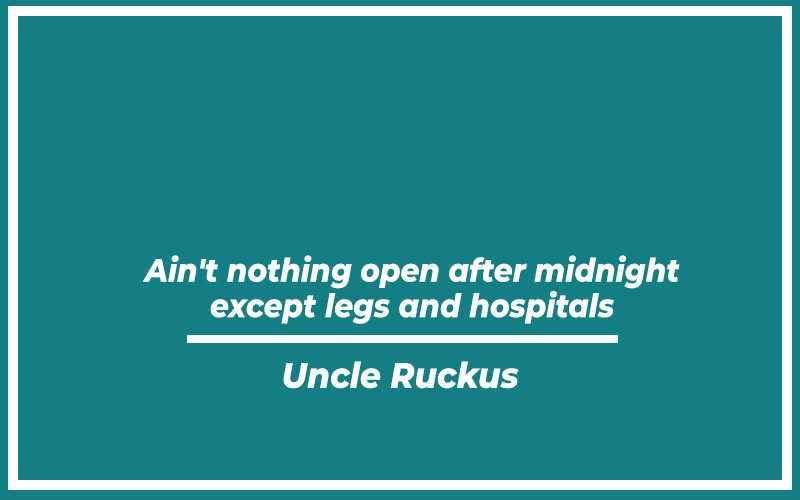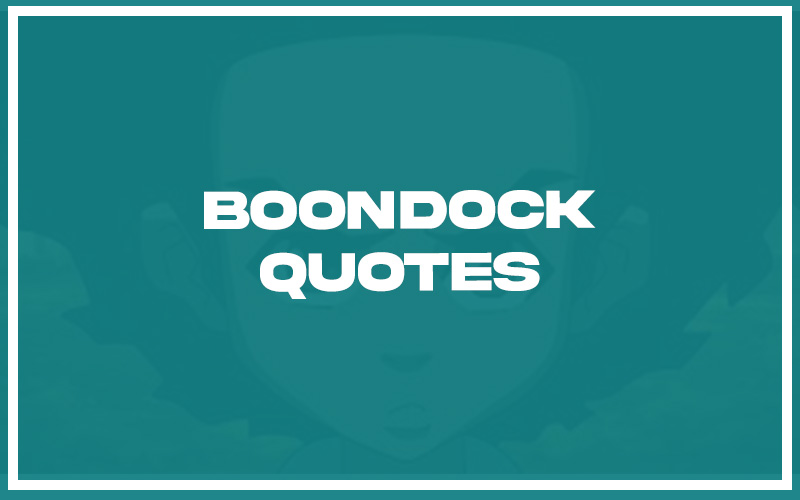When you dive into the world of “The Boondocks,” the quotes you find are not just humorous; they’re sharp, insightful, and often a biting commentary on social and political issues.
The characters, from the radical Huey to the irreverent Riley, deliver lines that make you laugh while simultaneously making you think deeply about the complexities of modern American culture.
These quotes have the unique ability to blend satire with serious critique, opening up conversations about race, identity, and society in ways that are as provocative as they are entertaining.
Best Boondock Quotes

“You do what you can to help people and they make you wonder… why you even bother…” – Huey Freeman
Huey Freeman’s quote reflects a common sentiment of disillusionment experienced by those who frequently extend help to others, only to feel underappreciated or questioned. This statement delves into the emotional toll that such experiences can have, challenging one’s motivation and altruism.
Despite these feelings, the quote also implicitly encourages persistence in benevolence, arguing for the intrinsic value of helping others, regardless of the immediate gratification or acknowledgment, thus promoting a selfless approach to personal actions and interactions.
Also Read: Date Night Quotes (with Explanation)
“What the hell is wrong with you people? Every famous ni that gets arrested is not Nelson Mandela.” – Huey Freeman
Here, Huey Freeman criticizes the tendency to romanticize public figures who face legal troubles, challenging the community to be more discerning about whom they choose to idolize.
This quote calls for a more critical evaluation of circumstances and behaviors, suggesting that not every figure who faces adversity is a martyr for a cause. It promotes the idea of not blindly following or supporting individuals based on fame alone, but rather on the merits of their actions and the context of their struggles.
“Oppressive systems need to keep the masses ignorant and stagnate the mental growth of the youth to ensure they never rebel against it.” – Huey Freeman
Huey Freeman comments on the tactics used by oppressive systems to maintain control, specifically through the stifling of education and critical thinking among young people. This quote underscores the importance of awareness and education in combating systemic oppression.
It encourages a proactive approach to learning and self-awareness as tools for empowerment and resistance, suggesting that knowledge and critical thinking are fundamental to challenging and changing entrenched power structures.
“The truth hurts. The world is a hard and lonely place and nobody gets anything for free. And you know what else? One day, you and everyone you know is gonna die.” – Huey Freeman
This stark portrayal by Huey Freeman captures a brutally honest perspective on life’s realities. It confronts the inevitability of death and the inherent struggles of existence, encouraging a no-nonsense acceptance of life’s challenges.
This commentary invites individuals to face these truths head-on, promoting resilience and a realistic approach to life’s inevitabilities. It argues that recognizing and accepting these hard truths can lead to a more profound appreciation of life and the motivation to make the most of it.
“So many people think about their religion only once a week. They don’t practice what they preach. I prefer to follow my own moral code instead of living as a hypocrite.” – Huey Freeman
Huey Freeman criticizes the superficial practice of religion and advocates for consistent, genuine ethical living according to one’s own moral compass. This quote challenges individuals to introspect about their own beliefs and behaviors, promoting integrity and authenticity in personal philosophy and actions.
It encourages living in accordance with one’s values consistently, rather than conforming to external expectations only superficially.
“Its time to rise, its time to walk the road of freedom, its time to throw off the yoke oppression, break free the chains and regain control of our destinies. It’s time for revolution.” – Huey Freeman
This powerful call to action by Huey Freeman exhorts listeners to actively challenge and overthrow oppressive structures. It embodies a revolutionary spirit aimed at radical change and self-determination.
This quote encourages taking bold steps towards personal and collective freedom, emphasizing the necessity of proactive engagement in the fight for justice and autonomy. It inspires courage and collective action, urging people to seize control of their destinies and reshape their conditions.
“Obi-Wan Kenobi once said ‘your eyes can deceive you, don’t trust them.’ It seems to be getting harder. Distinguishing reality from the illusions people make for us, or the ones we make for ourselves. I don’t know, maybe that’s part of the plan, to make me think I’m crazy… it’s working.” – Huey Freeman
Huey Freeman explores the complexity of perception and reality, reflecting on the difficulty of discerning truth in a world filled with deception. This quote discusses the manipulation of perception by external forces and the internal conflicts it creates, suggesting that such challenges may be intentionally designed to disorient or subdue individuals.
It encourages skepticism and critical analysis of the information and narratives that shape our understanding of the world, advocating for mental clarity and resistance against manipulation.
“What is the point of talking if nobody ever learns.” – Huey Freeman
Huey Freeman expresses frustration over the perceived futility of communication when it fails to lead to understanding or change. This quote challenges the effectiveness of dialogue in environments where learning and growth are stunted, prompting reflection on how we communicate and educate.
It underscores the need for meaningful interactions that not only convey messages but also foster learning and insight, advocating for a more impactful approach to communication that promotes real change.
“The absence of evidence is not the evidence of absence.” – Huey Freeman
Huey Freeman articulates a critical thinking principle that cautions against assuming something does not exist just because it has not been proven yet. This quote highlights the importance of keeping an open mind and recognizing the limits of our knowledge and observations.
It encourages a thorough and skeptical approach to information and claims, stressing that just because something hasn’t been observed, doesn’t mean it isn’t true or doesn’t exist. This promotes a more thoughtful and questioning stance towards understanding the world.
“It’s ain’t about luck, it’s about heart.” – Huey Freeman
Huey Freeman shifts the focus from external factors like luck to internal qualities such as courage and determination. This quote emphasizes the importance of personal resilience and passion over chance, suggesting that success is more about what’s inside us than the circumstances that surround us.
It inspires perseverance and personal responsibility in pursuing goals, promoting the belief that our efforts and attitudes are the main drivers of our achievements.
“Santa Claus is an Illuminati agent walking towards the new world order.” – Huey Freeman
In this humorously provocative statement, Huey Freeman offers a satirical conspiracy theory about Santa Claus. This quote reflects Huey’s critical and sometimes over-the-top perspective on society and its institutions.
It challenges viewers to think critically about the stories and figures that are widely accepted without question, pushing for a deeper examination of cultural myths and their origins or purposes. This encourages skepticism and a questioning attitude towards commonly accepted narratives.
“Being the bigger man is overrated.” – Huey Freeman
Huey Freeman questions the common advice of taking the high road during conflicts. This quote critiques the notion that always acting as the ‘bigger person’ in disputes is necessarily the best course of action, suggesting that it might sometimes lead to unresolved issues or personal dissatisfaction.
It challenges conventional moral advice, encouraging individuals to consider when it is appropriate to stand up for oneself rather than yield for the sake of peace.
“Fate, it would seem, is not without a sense of irony.” – Huey Freeman
Huey Freeman comments on the unpredictable and often ironic nature of fate. This quote reflects a philosophical observation that life’s outcomes can sometimes be unexpectedly contrary to what one might anticipate, highlighting the mysterious and uncontrollable aspects of our existence.
It encourages an acceptance of life’s unpredictabilities, promoting a perspective that embraces the ironies of fate as part of the human experience.
“We only fear the unknown. Knowledge dispels fear.” – Huey Freeman
Huey Freeman addresses the root of fear as a lack of understanding and posits that gaining knowledge is the key to overcoming it. This quote promotes the pursuit of awareness and learning as tools to combat fear and uncertainty.
It underscores the empowering effect of education and informed understanding, advocating for a proactive approach to learning as a means to foster confidence and security in navigating life’s challenges.
“What is the point of talking if nobody ever learns?” – Huey Freeman
Huey Freeman’s poignant observation questions the efficacy of communication when it fails to lead to understanding or change. This quote challenges us to consider the purpose and impact of our words. It promotes the idea that effective communication should educate, enlighten, or influence, not just convey information.
Huey’s frustration reflects a deeper desire for meaningful interactions that foster growth and transformation. It encourages individuals to engage in conversations that are not only expressive but also constructive, aiming to leave a lasting impact on the listener’s thoughts or actions.

“The absence of evidence is not the evidence of absence.” – Huey Freeman
Huey Freeman articulates a critical logical principle, reminding us that just because proof of something’s existence isn’t currently visible, it doesn’t mean it doesn’t exist. This quote encourages a mindset of openness and inquiry, advocating for intellectual humility and the pursuit of further evidence before drawing conclusions.
It challenges the listener to remain skeptical and questioning, particularly in complex or uncertain situations, promoting a thorough and reasoned approach to understanding the world.
“It’s ain’t about luck, it’s about heart.” – Huey Freeman
Huey Freeman emphasizes the importance of internal drive over external circumstances. This quote suggests that personal determination and passion are more significant than random chance in achieving success. It inspires perseverance and resilience, encouraging individuals to rely on their inner strength and commitment to overcome challenges.
By prioritizing ‘heart’ over luck, Huey advocates for a proactive and heartfelt engagement with life’s endeavors, highlighting the power of personal conviction in pursuing one’s goals.
“Santa Claus is an Illuminati agent walking towards the new world order.” – Huey Freeman
In this provocative statement, Huey Freeman uses humor and hyperbole to critique the commercialization and manipulation inherent in modern cultural myths like Santa Claus. This quote challenges us to examine the stories and symbols that permeate our society, questioning their origins and impacts.
Huey’s imaginative conspiracy theory serves as a metaphor for skepticism towards accepted norms and encourages a critical analysis of the messages embedded in popular culture.
“Being the bigger man is overrated.” – Huey Freeman
Huey Freeman challenges the common advice of consistently taking the high road in conflicts. This quote suggests that such an approach may not always be satisfactory or just, advocating for the assessment of situations where standing up for oneself might be necessary.
Huey’s statement encourages individuals to balance patience and assertiveness, promoting the idea that personal integrity and fairness sometimes require direct confrontation and resolution of issues rather than passive avoidance.
“Fate, it would seem, is not without a sense of irony.” – Huey Freeman
Huey Freeman reflects on the ironic nature of fate, suggesting that life often unfolds in unexpected and paradoxical ways. This quote acknowledges the unpredictable twists that challenge our expectations and plans. It invites us to embrace the uncertain and often humorous ways life can surprise us, encouraging a flexible and adaptive attitude towards the unexpected.
Huey’s commentary promotes resilience and a sense of humor in facing life’s ironies, suggesting that these qualities can help us navigate the complexities of fate with grace.
“We only fear the unknown. Knowledge dispels fear.” – Huey Freeman
Huey Freeman identifies ignorance as the root of fear and champions knowledge as its antidote. This quote encourages the pursuit of understanding as a means to confront and reduce fear, promoting education and awareness as essential tools for empowerment.
By advocating for informed curiosity, Huey underscores the transformative power of knowledge in alleviating anxieties and expanding personal and collective horizons. This commentary inspires a commitment to learning and discovery as fundamental strategies for building confidence and security in navigating life’s challenges.
“I find television very educating. Every time somebody turns on the set, I go into the other room and read a book.” – Huey Freeman
Huey Freeman critiques television’s educational value with a sarcastic remark that actually promotes reading as a superior method of learning. This quote underscores the idea that television often offers little substantive knowledge compared to the rich, in-depth learning one can gain from books.
Huey’s approach encourages viewers to seek out more intellectually stimulating activities than passive media consumption. It reflects his character’s preference for self-education and critical thinking, positioning reading as a valuable tool for personal growth and intellectual development.
“When y’all go to prison, the most important thing in your life is gonna be booty. A man’s butt.” – The Booty Warrior
This controversial quote from “The Booty Warrior” character uses shock value to highlight the grim realities of prison life, focusing on the topic of sexual dominance and vulnerability. It’s a dark commentary on the power dynamics and abuses that can occur within the prison system.
While humorously exaggerated, the quote serves to provoke thought about the conditions within penal institutions and the human rights issues that prisoners face, urging a reflection on the need for reform and better protection for those incarcerated.
“You give the meanest white man a piece of cheese and he turn into Mr. Rogers.” – Robert ‘Granddad’ Freeman
Robert ‘Granddad’ Freeman uses humor to address racial and social disparities, suggesting that even small gestures can soften the hardest of hearts. This quote employs a metaphorical piece of cheese as a symbol of how basic kindness can lead to surprising changes in behavior, promoting the idea that beneath tough exteriors, people can share universal human responses to kindness.
It’s a call to acknowledge and practice simple acts of generosity, which can bridge divides and transform attitudes.
“Okay, first of all, ain’t nobody talking while I’m talking.” – Uncle Ruckus
Uncle Ruckus’s demand for silence when he speaks reflects his authoritarian and often comically exaggerated sense of self-importance. This quote showcases his dominating personality and desire for control in conversations, emphasizing a common social dynamic where some individuals assert dominance through speech.
It serves as a humorous yet critical reflection on power dynamics in communication, encouraging viewers to consider how dialogue can sometimes be monopolized by those who demand to be heard above others.
“The world is a stage, we just players on it.” – Ed Wuncler I
Ed Wuncler I invokes a philosophical view of life as a series of performances, where individuals play roles dictated by societal and personal scripts. This quote encourages an examination of the authenticity of our actions and the extent to which societal expectations shape our behavior.
It challenges viewers to consider their own roles and perhaps strive for more genuine expressions of self, beyond the roles they are expected to play, highlighting the performative aspects of social interactions.
“Game recognizes game, Granddad.” – Riley Freeman
Riley Freeman’s statement, “Game recognizes game,” speaks to mutual recognition of skill or cunning between individuals. This quote reflects an understanding that people often acknowledge and respect similar traits or strategies in others that they themselves employ.
It encourages appreciation of savvy and adeptness in various contexts, whether in sports, business, or personal interactions, promoting a sense of respect for competence and cleverness.

“Ain’t nothing open after midnight except legs and hospitals.” – Uncle Ruckus
Uncle Ruckus delivers this line with his characteristic blunt humor to warn about the perils of late-night activities. This quote humorously yet poignantly suggests that venturing out late at night often leads to trouble or emergencies, using a vivid analogy to drive the point home.
It’s a crude but effective reminder of the potential consequences of nocturnal escapades, advising caution and safety in choosing how and when to spend one’s time after dark.
Also Read: Childhood Trauma Quotes (with Explanation)
Final Thoughts
Reflecting on “The Boondocks” quotes, you’ll find that they offer much more than comic relief.
They serve as powerful reflections on life’s absurdities and injustices, challenging you to see the world through a more critical lens.
Whether these quotes inspire you to question the status quo or simply appreciate the cleverness of the show’s writing, they underscore the importance of using humor as a tool for social commentary.

